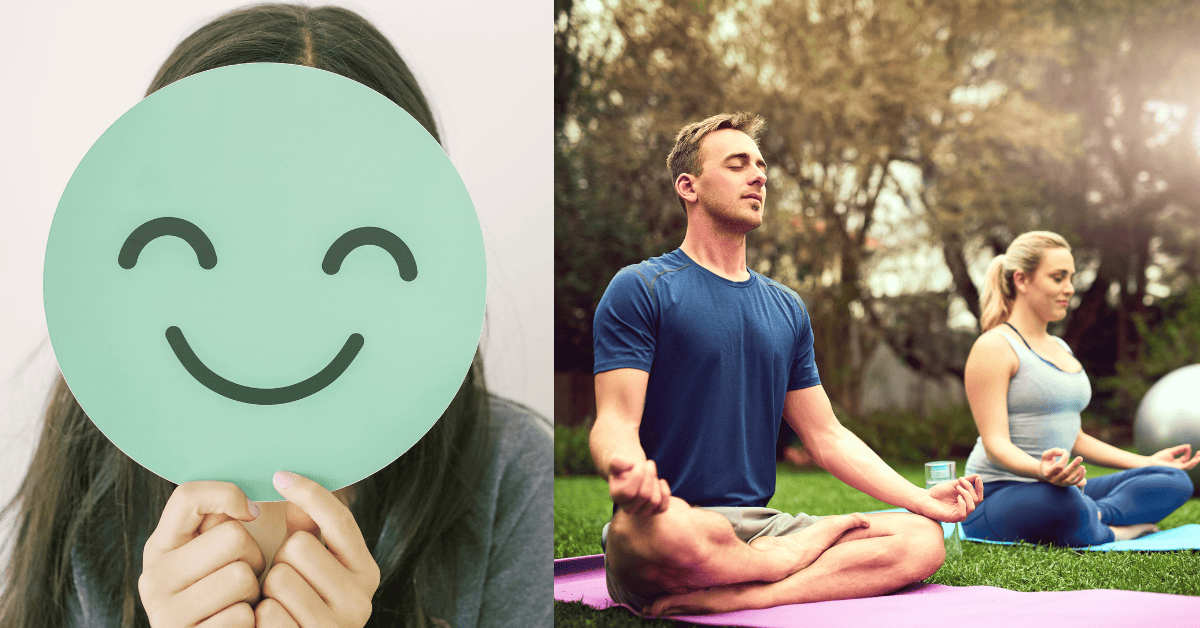Let’s cut the fluff—mental health matters more than ever, and no, you don’t need to be locked in a mountain monastery or sipping moon-charged matcha to improve it.
Ali Abdaal, a popular doctor-turned-YouTuber, dropped a bombshell of a video that cuts through the noise and shows how simple mental shifts can transform your life. We’re diving headfirst into the truth bombs, science, stories, and strategies shared in his YouTube video: How To Improve Your Mental Health. You’re gonna want to save this.
Let’s break it down.
What Does It Really Mean to “Improve Your Mental Health”?
Definition in Plain Terms
Mental health is like the operating system in your brain—it’s how you process life, feelings, stress, and Netflix spoilers.
Improving mental health doesn’t mean pretending you’re happy. It means being okay with the ups, downs, and WTFs of life.
Why Mental Health Is Just As Important As Physical Health
Imagine trying to jog with a broken leg. Now imagine trying to live with a mind that’s constantly screaming. Yeah—same level of urgency.
Why Bother? The Cold, Hard Stats You Can’t Ignore
Let’s get uncomfortable:
800,000 people die by suicide yearly—that’s one every 40 seconds (WHO).
Anxiety disorders affect 284 million globally—women twice as likely as men (Our World in Data).
75% of mental health conditions start by age 24. Yet, the average delay in seeking help? 11 years (NAMI).
Ignoring mental health isn’t an option—it’s a ticking time bomb.

5 Tips to Improve Your Mental Health (Backed by Science)
1. Move Your Body—But Ditch the Gym if You Hate It
The Science: Exercise boosts serotonin and dopamine—your brain’s “feel-good” chemicals. But forcing yourself to run? Counterproductive.
The Hack: Dance in your kitchen. Walk while calling a friend. Play tag with kids. A 2021 study found “joyful movement” reduces depression symptoms 26% faster than regimented workouts (Journal of Happiness Studies).
Quote to Steal: “Exercise is a celebration of what your body can do, not punishment for what you ate.” —Anonymous.
2. Eat Like Your Gut Controls Your Mood (Because It Does)
The Science: Your gut produces 90% of serotonin. Processed foods? They feed bad bacteria linked to anxiety.
The Hack: Add fermented foods—kimchi, yogurt, kombucha. A 2023 trial showed probiotics reduced anxiety in 55% of participants (Frontiers in Neuroscience).
Stat Alert: People who eat 8+ servings of veggies daily have a 24% lower risk of depression (Harvard Medical School).
3. Sleep—The Underrated Game-Changer
The Science: Poor sleep spikes cortisol (stress hormone) and shrinks brain regions regulating emotions.
The Hack: Ditch screens 90 minutes before bed. Try the “4-7-8” breathing trick: Inhale 4 secs, hold 7, exhale 8. Repeat 4x.
Shocker: Chronic insomnia triples your risk of depression (Sleep Foundation).
4. Social Media Detox—Less Scrolling, More Living
The Science: Comparing yourself to curated feeds activates the brain’s pain centers. Teens who spend 3+ hours daily on social media have a 60% higher risk of depression (JAMA Psychiatry).
The Hack: Turn off notifications. Schedule “scroll-free” hours. Follow accounts that inspire, not inflame.
Reality Check: A 2022 survey found 70% of people felt “mentally lighter” after a 7-day social media break (Pew Research).
5. Embrace Boredom—Yes, Seriously
The Science: Constant stimulation fries dopamine receptors. Boredom sparks creativity and problem-solving.
The Hack: Sit quietly for 10 mins daily. Stare out a window. Let your mind wander.
Expert Take: “Boredom is the gateway to self-discovery.” —Dr. Sandi Mann, psychologist and author.
Mental Health Through the Ages: A Timeline of Progress (And Setbacks)
1949: First Mental Health Awareness Month—stigma was so thick, patients were called “lunatics.”
1987: Prozac hits the market—antidepressant use skyrockets 400% in a decade.
2013: The DSM-5 (psychiatry’s “bible”) redefines mental disorders—ADHD and autism spectrum added.
2020: Teletherapy explodes during COVID—63% of therapists now offer virtual sessions (APA).
2023: Ozempic and Wegovy studied for bipolar disorder—could weight loss drugs ease mental symptoms?
Shocking Tip #1 – Stop Chasing Happiness, Focus on Meaning
What the Video Says About the Happiness Trap
Ali drops a hammer: “If you aim for happiness, you’ll miss it.” Ouch—but true.
He quotes Viktor Frankl, Holocaust survivor and psychiatrist, who said, “Happiness cannot be pursued; it must ensue.”
Living with Purpose: How It Rewires Your Brain
Having a why lights up your dopaminergic pathways. In simple terms, your brain loves clarity, goals, and stories where you’re the hero.
Shocking Tip #2 – You’re Not Your Thoughts
The Mind ≠ You: Explaining Cognitive Defusion
Ever had a thought like “I’m worthless”? That’s not you talking. That’s your brain’s spam folder.
Cognitive defusion = stepping back and watching your thoughts like a Netflix show you didn’t ask to play.
Practical Exercise
Label your thoughts: “Here’s anxiety again, trying to boss me around.”
Boom. Power shift.
Shocking Tip #3 – Try the “Reverse Gap” Thinking
Always Looking Forward? It’s Exhausting
We’ve all been there: chasing the next goal, thinking, “Then I’ll be happy.”
Ali suggests the “reverse gap”—look back at how far you’ve come instead.
Gratitude Technique (Backed by Harvard)
Write down 3 things you’ve accomplished. Daily. No skipping. Even if it’s “I didn’t scream at the printer today.”

Shocking Tip #4 – Make Friends with Boredom
Dopamine Detox – Explained Like You’re Five
Too much TikTok = brain burnout. We crave constant stimulation, and our dopamine system short-circuits.
Ali recommends sitting in silence. No phone. Just you, your thoughts, and maybe a spider in the corner.
Uncomfortable? Good. Growth lives there.
Shocking Tip #5 – Design Your Life, Don’t Just Drift
Ikigai: The Japanese Concept of Fulfilling Work
Find something you’re good at, that pays, and that helps others. Boom—Ikigai.
Ali breaks it down like a grilled cheese—simple but satisfying.
What Science Really Says About These Practices
Mindfulness rewires the brain—Stanford confirms.
Meaning reduces depression—Yale’s on board.
Dopamine fasting improves emotional regulation—according to UC Berkeley.
No sage-burning needed—just habits.
Who Is Behind This Advice? Meet Ali Abdaal
Former doctor. Now a productivity YouTuber with a British accent smoother than Nutella on toast.
He’s not selling woo-woo—he’s explaining neuroscience like your favorite cousin.
Real-Life Reactions: What Are People Saying About This Video?
From the YouTube comments:
“This video changed my relationship with my anxiety.”
“I cried. I’m not even ashamed.”
“I made my therapist watch it.”
Viral with reason.
Timeline of Events in the Video
0:00–3:00 – Intro + “you’re not your thoughts”
4:00–6:30 – Purpose and Viktor Frankl talk
6:30–9:00 – Dopamine detox and boredom
9:00–end – Action plan + quote bombs
Most emotional moment? Around 8:45. Watch with tissues.
Public Reactions: How Society’s View Has (Finally) Shifted
The Good: Celebrities like Simone Biles and Selena Gomez normalize therapy. Memes about anxiety go viral—laughter as medicine.
The Bad: “Toxic positivity” trends—phrases like “good vibes only” shame valid struggles.
The Ugly: 60% of employees still fear mental health discrimination at work (Mind Share Partners).
Can These Mental Health Tips Work for Everyone?
Yes—and no.
If you’re dealing with clinical depression, PTSD, or severe anxiety, please seek help from a professional.
But for everyday stress, overthinking, existential crises at 3 AM? These tools work.
Future Implications: Could This Shift the Way We View Mental Health?
Imagine schools teaching “purpose over pressure.” Offices with reflection rooms. Phones with built-in boredom breaks.
Sounds wild. But it’s already starting.
Ali’s message? It’s not about chasing happy—it’s about building meaning.
Action Plan – Start Using These 5 Tips Today
Daily
3-minute thought labeling
Gratitude journaling
Silent time
Weekly
Purpose check-in
Dopamine detox hour
Monthly
Reflect on growth
Adjust goals
Join like-minded folks here: https://gemscor.com/

Final Words: This Isn’t Woo-Woo – It’s Neuroscience
We’re not saying you’ll wake up enlightened tomorrow. But if you even start to think differently about thoughts, purpose, and boredom?
You’ve already improved your mental health.
So breathe. You’re doing better than you think.
The Future of Mental Health—What’s Next?
AI Therapists: Chatbots like Woebot offer CBT techniques 24/7—but can they handle crises?
Psychedelic Therapy: MDMA trials show 67% remission in PTSD (MAPS). Could shrooms replace SSRIs?
Workplace Revolution: Companies like Calm offer “mental health days”—will this become law?
Final Word: Your Mental Health Isn’t a Luxury—It’s Oxygen
Here’s the raw truth: You can’t pour from an empty cup. Improving your mental health isn’t selfish—it’s survival. Start with one tiny change today. Walk around the block. Delete TikTok for a day. Eat a vegetable. Progress, not perfection.
Ready to Take the First Step? Dive deeper with actionable guides and expert advice at Gemscor. Because you deserve to thrive—not just survive.
FAQs – Real Questions People Are Asking About Mental Health
Q1: What’s the easiest way to start improving mental health today?
Start labeling your thoughts and try 2 minutes of silence daily.
Q2: What is the “reverse gap” technique?
It’s reflecting on how far you’ve come, not how far you have to go.
Q3: Is boredom really good for you?
Yes! It resets your brain’s dopamine levels and sparks creativity.
Q4: Who is Ali Abdaal?
A former doctor and popular YouTuber who simplifies science-backed self-improvement.
Q5: Can these tips help with anxiety?
They can manage everyday anxiety—but see a professional for severe cases.
Q6: What’s Ikigai?
A Japanese concept meaning “reason for being,” based on joy, talent, and service.
Q7: Are there scientific studies backing this stuff?
Yes. Stanford, Yale, and Berkeley have all published supporting research.
Q8: What’s the connection between purpose and happiness?
Purpose leads to sustainable happiness. Chasing happiness directly often backfires.
Q9: How long before I see results?
Some people feel changes in a week. For others, it takes a few months of practice.
Q10: Is journaling really worth it?
Absolutely. It’s like decluttering your brain every morning.
Q11: How do I know if I need professional help?
If your thoughts interfere with daily life—get help. No shame in that.
Q12: Can kids benefit from these tips?
Yes, especially the gratitude and boredom practices.
Q13: Is this better than meditation?
It includes aspects of meditation—but is often more actionable for beginners.
Q14: What’s dopamine detox exactly?
A short break from stimulating activities to reset your brain’s reward system.
Q15: Can pets improve mental health?
74% of pet owners report better mental health—cuddling releases oxytocin (Human-Animal Bond Research Institute).
Please don’t forget to leave a review.
Explore more by joining me on Gemscor.














